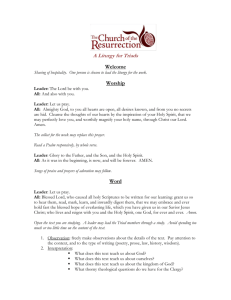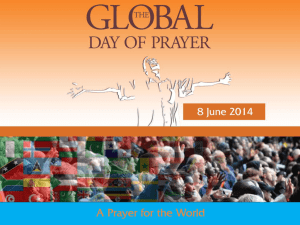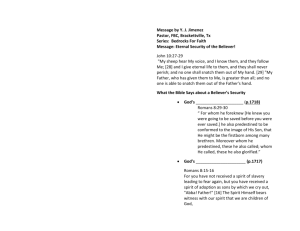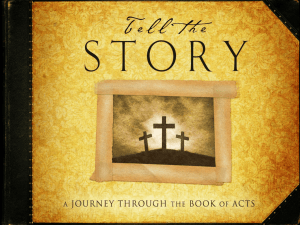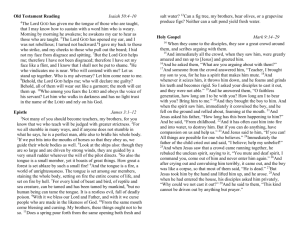2015-08-02 THE PREMIÈRÉ OF THE HOLY SPIRIT
advertisement
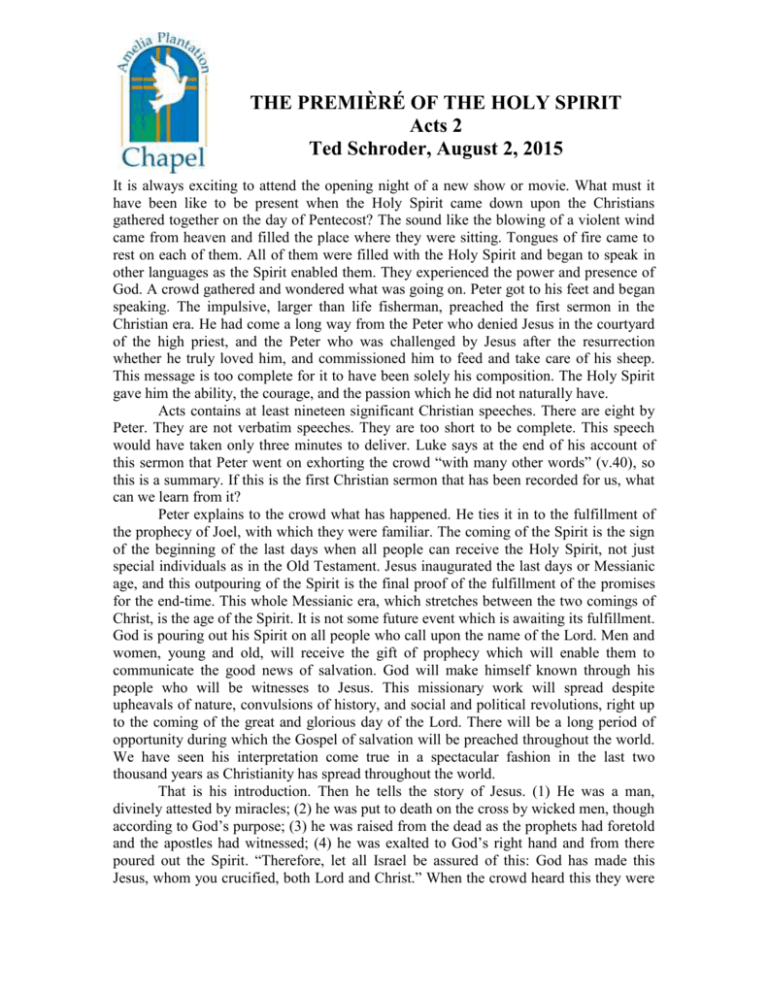
THE PREMIÈRÉ OF THE HOLY SPIRIT Acts 2 Ted Schroder, August 2, 2015 It is always exciting to attend the opening night of a new show or movie. What must it have been like to be present when the Holy Spirit came down upon the Christians gathered together on the day of Pentecost? The sound like the blowing of a violent wind came from heaven and filled the place where they were sitting. Tongues of fire came to rest on each of them. All of them were filled with the Holy Spirit and began to speak in other languages as the Spirit enabled them. They experienced the power and presence of God. A crowd gathered and wondered what was going on. Peter got to his feet and began speaking. The impulsive, larger than life fisherman, preached the first sermon in the Christian era. He had come a long way from the Peter who denied Jesus in the courtyard of the high priest, and the Peter who was challenged by Jesus after the resurrection whether he truly loved him, and commissioned him to feed and take care of his sheep. This message is too complete for it to have been solely his composition. The Holy Spirit gave him the ability, the courage, and the passion which he did not naturally have. Acts contains at least nineteen significant Christian speeches. There are eight by Peter. They are not verbatim speeches. They are too short to be complete. This speech would have taken only three minutes to deliver. Luke says at the end of his account of this sermon that Peter went on exhorting the crowd “with many other words” (v.40), so this is a summary. If this is the first Christian sermon that has been recorded for us, what can we learn from it? Peter explains to the crowd what has happened. He ties it in to the fulfillment of the prophecy of Joel, with which they were familiar. The coming of the Spirit is the sign of the beginning of the last days when all people can receive the Holy Spirit, not just special individuals as in the Old Testament. Jesus inaugurated the last days or Messianic age, and this outpouring of the Spirit is the final proof of the fulfillment of the promises for the end-time. This whole Messianic era, which stretches between the two comings of Christ, is the age of the Spirit. It is not some future event which is awaiting its fulfillment. God is pouring out his Spirit on all people who call upon the name of the Lord. Men and women, young and old, will receive the gift of prophecy which will enable them to communicate the good news of salvation. God will make himself known through his people who will be witnesses to Jesus. This missionary work will spread despite upheavals of nature, convulsions of history, and social and political revolutions, right up to the coming of the great and glorious day of the Lord. There will be a long period of opportunity during which the Gospel of salvation will be preached throughout the world. We have seen his interpretation come true in a spectacular fashion in the last two thousand years as Christianity has spread throughout the world. That is his introduction. Then he tells the story of Jesus. (1) He was a man, divinely attested by miracles; (2) he was put to death on the cross by wicked men, though according to God’s purpose; (3) he was raised from the dead as the prophets had foretold and the apostles had witnessed; (4) he was exalted to God’s right hand and from there poured out the Spirit. “Therefore, let all Israel be assured of this: God has made this Jesus, whom you crucified, both Lord and Christ.” When the crowd heard this they were “cut to the heart” (stung, convicted) and said to Peter and the other apostles, “Brothers, what shall we do?” Peter tells them the response God is looking for. They are to turn from their unbelief and disobedience and commit themselves to following Christ: “repent and be baptized, every one of you, in the name of Jesus Christ for the forgiveness of your sins.” They will receive this gift of the Holy Spirit. This is necessary if they are to be saved from the corrupt and depraved lifestyle of their contemporaries and transferred into the new community of Jesus. He warned them and pleaded with them (“with many other words”) to commit themselves to follow Christ. What can we take away from this tour de force? First, if Peter could do this, so can we. The Holy Spirit can give us the ability, the courage, and the passion to communicate the Gospel to our generation. The presence and power of the Holy Spirit is available for us in these days just as much as he was at Pentecost to the disciples. No Christians can say that they do not have the same Spirit. He is given to each one of us, young and old, man and woman. Call upon the Holy Spirit to guide you to share the Gospel with others. He will give you the words to say. Be bold. Second, if these are the last days we should take seriously the need for people to prepare themselves for the coming of the great and glorious day of the Lord, for the Lord will come for us on a day we least expect it. All people, not just the crowd in Jerusalem, are responsible for putting Jesus to death by nailing him to the cross. Our sins put him there. But our guilt is forgiven if we respond in repentance and faith to Jesus. We should seize the opportunity afforded us to communicate this Gospel in season and out of season, when there are crises and tragedies and social upheavals. The only answer to the despair and miseries of this world is the Gospel of the love of God. We saw this in the response of the families of those who were murdered in their church in Charleston. They found their consolation and strength in their faith in Jesus Christ. Third, at the heart of who we are is our conviction that Jesus is Lord and Savior, accredited by God to us by miracles, signs and wonders; who died on the cross for our sins, according to the set purpose and foreknowledge of God who raised him from the dead to give us new life; who fulfilled all the prophecies of the Old Testament and corroborated by the eyewitnesses of the apostles. This Jesus is present now by his Holy Spirit to call us to follow him. After I gave Holy Communion to one of my congregation in his sick bed, he said to me, “The only answer is Christ”. If all this is true then we will devote ourselves to the apostles’ teaching (reading and studying the Bible), and the fellowship of Christ’s followers, to the breaking of bread (gathering around the Lord’s Table with the Lord’s family), and to prayer. We will support one another; sharing with one another with glad and sincere hearts, praising God and enjoying the favor of all the people. The Lord will add to our number those who are being saved. The crowd asked, “What shall we do?” Peter quoted Joel: “Everyone who calls on the name of the Lord will be saved.” Call on his name. As you receive the bread and the cup: the Body of Christ broken and the Blood of Christ shed for you pray, “Lord Jesus come into my life. Come in today. Come in to stay. Come into my life Lord Jesus.” (Ted’s booklet: “Why I Believe in Jesus Christ” is available on Kindle at www.amazon.com. His blog is found at www.tedschroder.com )




